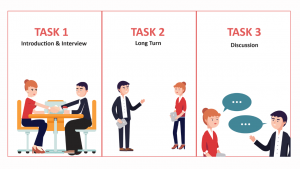
Understanding the IELTS Speaking Section
Welcome to guide on preparing for the IELTS Speaking Section! This crucial part of the IELTS exam often makes candidates nervous, but with the right preparation and practice, you can excel. In this article, we will delve into expert tips, strategies, and insights to help you feel confident and ready on exam day.
Let’s start by understanding the structure and format of the IELTS Speaking Section. This section is designed to assess your ability to communicate effectively in English. It consists of three parts, each with a specific focus.
Part 1: Introduction and Interview
In this section, the examiner will ask you general questions about yourself, your interests, and everyday topics. It’s essential to answer these questions clearly and concisely while showcasing your speaking abilities.
Part 2: Long Turn
Next, you will be given a task card with a particular topic. You will have one minute to prepare and then speak about the topic for 1-2 minutes. This part tests your ability to speak at length on a given subject.
Part 3: Discussion
Finally, you will engage in a discussion with the examiner related to the topic in Part 2. This section assesses your ability to express opinions, analyze ideas, and engage in a conversation.
How is the IELTS Speaking Section Scored?
Throughout the three parts of the speaking IELTS test, you are evaluated on 4 criteria:
- Vocabulary
- Pronunciation
- Fluency and cohesion
- Grammar
Each criterion carries 25% of the total marks. At the end of the test, you get a score in each criterion with 1 as the lowest and 9 as the highest score. Your band score for the speaking test is the total of all criteria divided by 4.
Prepare for the IELTS Speaking Test
Now that you have a clear picture of the pattern, start off with your preparations by making a study plan and then sticking to it.
- Dedicate half an hour each day to either listening or reading something in English. When you read, do it aloud. It helps in pronunciation.
- Commit another half an hour every day to speaking English, preferably with another person who is fluent in the language.
- Learn the correct grammar and functional language use specific to topics the test asks.
- Since the speaking test is a representation of real life, it is better to imitate this aspect while preparing. Instead of writing down the answers to questions, find a study partner. Talk to them and practice by answering their questions.
- If you cannot find a partner, speak to a mirror or, better yet, record your answers. Listening to the audio will help you improve pronunciation, modulation and fix grammar errors.
- A common reason why candidates get low scores in the speaking test is brief answers. Therefore, while preparing, try to explain your answers. E.g., for the question ‘Do you often wear makeup?’ The answer ‘No, I don’t prefer to wear makeup frequently because I feel it damages the skin and masks my identity’ is likely to get more marks than the answer ‘No, I don’t wear makeup often.
Where To Study for the IELTS Speaking Section From?
- This is one section of the IELTS that can’t be learned from a book, but the official IELTS practice materials are an excellent place to start for sample questions.
- English news channels and podcasts are another resources to study for the speaking test.
- To get your pronunciation correct, use online dictionaries that let you listen to how a word is articulated.
- The ieltsmaterial.com is a website that has a lot of useful material for the IELTS speaking test practice.
- The British Council site is also a sound resource.
Immersion in English
To improve your speaking skills, immerse yourself in the English language as much as possible. Watch English movies, listen to podcasts, read books, and practice speaking with friends or language partners.
Practice Mock Speaking Tests
One of the best ways to prepare is by simulating the exam environment. Take advantage of online resources or work with a tutor to conduct mock speaking tests. This will help you get accustomed to the format and build confidence.
Focus on Fluency and Coherence
During the exam, aim to speak fluently and coherently. Practice speaking at a natural pace, using transitional phrases to connect ideas. Avoid long pauses and focus on delivering your thoughts clearly.
Expand Your Vocabulary
Having a wide range of vocabulary will enhance your speaking abilities. Learn new words, phrases, and idioms, and practice using them in different contexts. This will impress the examiner and elevate your responses.
Time Management Skills
Part 2 of the Speaking Section requires you to speak for 1-2 minutes on a given topic. Practice managing your time effectively during preparation. Use the one-minute preparation time wisely to organize your thoughts.
Stay Calm and Confident
On exam day, it’s normal to feel nervous, but remember to stay calm and composed. Take deep breaths, maintain eye contact with the examiner, and speak with confidence. Believe in your preparation and abilities.
Conclusion
Preparing for the IELTS Speaking Section requires dedication, practice, and confidence. By following the strategies outlined in this guide, you can sharpen your speaking skills, expand your vocabulary, and approach the exam with assurance. Remember to stay calm, stay focused, and showcase your best English-speaking abilities on exam day!
Get assistance to study abroad from our international education experts at Gateway International and get free online consultancy for study abroad who can help guide you throughout your study abroad journey & avail our wide range of services for students on destinations like study in UK, study in USA, study in Canada, study in Ireland, study in Australia , study in the Netherlands and many other countries.
FAQs
Is it okay to use informal language during the Speaking Section?
While it’s essential to speak naturally, avoid using overly informal language. Aim for a balance between casual and formal speech to showcase your versatility.
What should I do if I don’t understand a question during the exam?
If you encounter a question you don’t understand, politely ask the examiner to clarify. Don’t hesitate to seek clarification to ensure you provide a relevant response.
How important is pronunciation in the IELTS Speaking Section?
Pronunciation plays a crucial role in the Speaking Section. Practice pronunciation of common words, pay attention to intonation, and aim for clarity in your speech.
Can I use fillers like “uhm” and “uh” during the Speaking Section?
While it’s natural to use fillers occasionally, try to minimize them. Practice speaking fluently without relying heavily on fillers to convey your thoughts smoothly.



